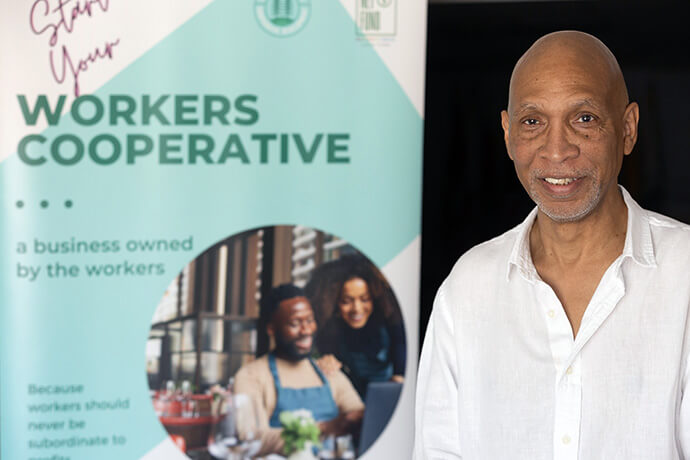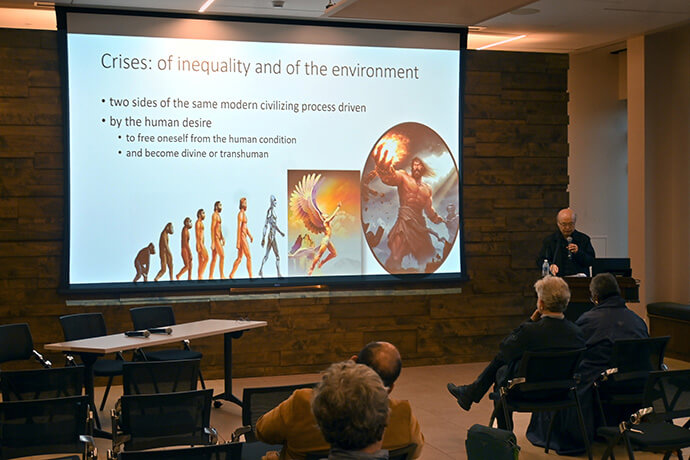Key points:
- Joerg Rieger, a prominent United Methodist scholar from Germany, leads a center at Vanderbilt Divinity School that probes the intersection of religion, economics and ecology.
- The Wendland-Cook Program in Religion and Justice supports a business model where workers own and operate a company instead of the typical corporate structure.
- Rieger has published more than 20 books and works in the tradition of liberation theology.
Looking for an event last April at Vanderbilt Divinity School, a reporter mistakenly wandered into Vanderbilt’s nearby Owen Graduate School of Management.
Little did the business students know when they politely directed the reporter to the nearby divinity school, the discussion that night would be in part about the possibilities of a “post-capitalist society.”
“There’s a famous joke that says Christians talk about sexuality so much because they don’t want to talk about politics,” said Joerg Rieger, founding director of the Wendland-Cook Program in Religion and Justice at the divinity school, during a June 13 Zoom event about his book “Jesus vs. Caesar: For People Tired of Serving the Wrong God.”
“There’s certainly some truth to that, right?” added Rieger, a prominent Christian scholar and United Methodist. “But I would expand that joke and say Christians do not talk about politics so much because we don't want to talk about the economy.”
The Wendland-Cook program is focused “on issues of justice that arise at the intersection of religion, economics and ecology,” according to its website.

Rieger — who has published more than 25 books — works in the tradition of liberation theology, which arose in Latin America and other places around the world in the late 1960s in response to the church’s involvement in slavery, conquest and colonialism. These traditions have gone through various developments and are still actively pursued by new generations of theologians around the world.
Liberation theology exhorts Christians to be in the thick of political issues on the side of the poor and disadvantaged. Rieger is interested in how the church can interact with unions, health care reformers, climate change activists and others to benefit less-wealthy people. As a religious scholar, he cites the Bible as the foundation of his views.
Matthew 4:1-11 is one place to start.
“The temptation story, right?” Rieger said. In the story, Satan tempts Jesus in the wilderness, offering him “power over all these kingdoms” if he worships the devil. Jesus refuses.
“Jesus rejects the offer because it's offered by the devil,” Rieger said. “I would argue that what Jesus rejects here is a bigger thing. … Jesus rejects top-down power.
“Jesus actually wants to change the world, and in order to do that, you have to somehow affiliate yourself with people. You have to organize. … Organizing goes all the way to the core.”

Rieger said that Christ’s teachings flip the script on the usual conceptions of power and wealth — elevating the concerns of people at the bottom of the economic food chain. Mathew 5:5 seems to support that viewpoint: “Blessed are the meek, for they will inherit the earth.”
With that in mind, Rieger said he gets involved in with social movements, worker cooperatives, labor issues —wherever people organize to make a difference.
“That’s where I think alternative power gets built,” Rieger said. “I’m not frustrated about power. I don't think power is evil. But how do we build alternatives to top-down power?”
One method being used to move in this direction are Solidarity Circles, which put activists from faith and economic entities together and to support one another and to reshape both religion and the economy.” Solidarity Circle members take nine months of training to “help diversely align your institution or community with the solidarity economy.” Rieger hopes that these will be the ingredients for new awakenings and reformations.
Dealing with top-down power in the church
As Joerg Rieger works to counter the top-down power structure in corporate America, he has to acknowledge that the church — even his own United Methodist Church — is subject to undue influence by the desires of its wealthiest members.
“Years ago a former student of mine was making a careful suggestion from the pulpit that Christians should be caring about other people, including sick people,” Rieger said.
Taken as a comment against the free market, the statement resulted in trouble for the pastor.
“It happened in a fairly moderate congregation, so why would my student get in trouble with the bishop?” Rieger said. “What we’re suspecting is that people that hold the purse strings in the church actually got in touch with the bishop, and the bishop got worried.”
The sermon was mainstream enough that it won second place in a sermon contest, he said.
“My basic argument is (that) there are some big flows of power and money that these days prevent us from actually doing our work,” Rieger said. “You can see this in the economy; you can see how money flows in big business.
“But I’m a theologian. I’m also very interested … in how money flows in the church, how it allows us to say certain things and how it prevents us from actually saying certain things.”
Siobhan Garrigan, Loyola Chair of Theology at Trinity College Dublin, put it this way during the June book forum: “The question isn’t whether capitalism is good or bad, but how we put to use its benefits and how do we negotiate its tensions?
“Do we have to live with the tension between capitalist wealth and extreme poverty, or should we as Christians imagine, articulate and insist on an alternative economic system?”
During the April event, visiting liberation theologian Jung Mo Sung took it further, musing about “another economy, a post-capitalist” economy.
“One can only radically criticize the capitalist utopia by visualizing an alternative utopia, of a society in which all human beings are included, living in dignity and the relationship between human beings and their environment is not destructive to themselves and … non-human beings,” Sung said.
The Wendland-Cook Program is involved in efforts like supporting small businesses to consider alternatives to the standard corporate way of organization.
The Southeast Center for Cooperative Development, whose efforts the Wendland-Cook Program supports, has worked with 15 to 20 small businesses so far to help them start up or convert businesses to a cooperative enterprise operating structure, where workers own and control their workplace.
The center’s co-directors are Benny Overton and Rosemarie Henkel-Rieger, who is Joerg Rieger’s spouse.
“So far, we haven't had a lot of resistance,” said Overton, the former president of United Auto Workers Local 737. “There are some people who question what we’re doing. I can remember a few years ago when we had a session where we were kind of introducing the concept, and someone accused us of being communist.”
They aren’t going for communism, but Overton is less worried about the term socialism, an approach he sees as compatible with Christ’s approach.
“It is a lot of the teachings of Christ, and what the early disciples try to do seems to be somewhat socialistic,” said Overton, who grew up United Methodist but is now religiously unaffiliated.
“What it does is recognizes our collective nature … rather than this individualistic view of self. We see ourselves as part of a collective whole.”
The center’s co-op projects include a vegan bakery in Memphis, a Nashville trucking company co-op formed by ex-inmates, and Nashville Foodscapes, a business that works with homeowners to make their yards a source of food and ecologically friendly.
Nashville Foodscapes was founded as a traditional business in 2010, then reorganized as a co-op in 2021 with the center’s help, said co-owner and founder Jeremy Lekich. It now has seven owners, including Lekich.
“I see it as a radical and ancient way to work with people,” Lekich said. “To be interdependent with a group of people and to have shared values and also shared power and really understanding our interdependence with each other.
“That is what humans have been doing for most of human history. … It’s really kind of a modern, capitalist twist on an ancient way of living.”
The new structure has had bumps in the road, but has been generally successful, Lekich said.
Subscribe to our
e-newsletter
Nashville Foodscapes has no connection to the Vanderbilt program, but it has unknowingly benefited from its work through Southeast Center for Cooperative Development. And statistically, it is less likely to fail than a traditional small business, Rieger said.
“Co-ops are more stable businesses,” he said. “We think that small businesses are really the foundation of American success. … So in five or 10 years, co-ops are more likely to be in existence, and also have a much better track record in repaying their loans.”
Rieger has no delusions that corporate America is going to be supplanted by the co-op movement anytime soon.
“It’s sort of like Moses, looking into the promised land or talking about going on the mountaintop,” he said. “I’m not expecting to go into the promised land myself.
“But on the other hand, this is what keeps me going, and this is why I am probably as excited about my work as I ever was, because I think there's some real work to be done. And there's some real evidence that God is actually at work.”
Patterson is a UM News reporter in Nashville, Tennessee. Contact him at 615-742-5470 or newsdesk@umnews.org . To read more United Methodist news, subscribe to the free Daily or Weekly Digests.




